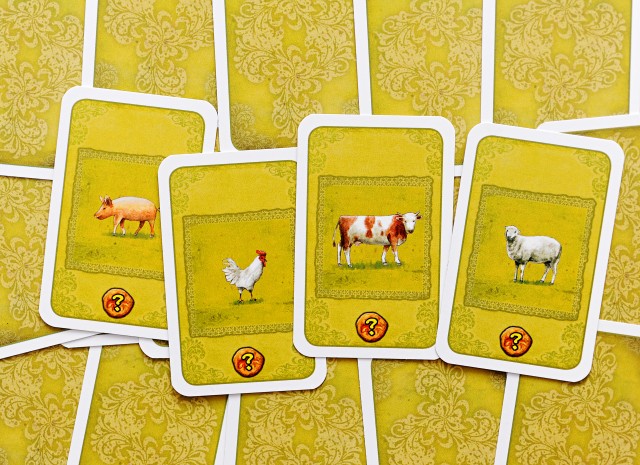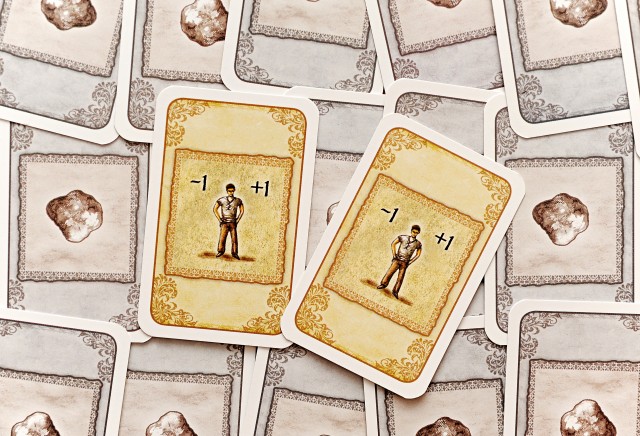I love Castles of Burgundy. It’s one of my favourite Felds. A two-player game, with people who know how to play can really hum along at a great pace with lots of fun lead changes. When I first started seeing pictures of the card version of COB I was a little bit worried. I’m not usually a fan of simplified dice or card versions of popular games. It’s not to say there haven’t been some great translations, but I just find myself wishing I was playing the original. That, being said I heard a lot of goods things about this card version and was anxious to give it a shot.
COB: The Card Game is played out over the course of five rounds with six turns each round. Like the base game you play a French lord trying to expand your territory in the Loire Vally in the 15th century. Players start with a Storage, an Estate and a project as well as an animal, a silver(money), a good (with two numbers), and one or two workers. A display is created at the start  of each of the rounds with action cards consisting of the types of structures you’ll remember from the base game; castles, mines, ships pastures, and buildings. Added in are a new type of building, cloisters which works as sort of a wild card. Groupings of three of the same type of structure in your estate is worth points at the end of the game. The display has the numbers one to six and cards are added randomly below each number (three cards per player plus one). The very last card to be added will be placed based on the dice number at the top of the card.
of each of the rounds with action cards consisting of the types of structures you’ll remember from the base game; castles, mines, ships pastures, and buildings. Added in are a new type of building, cloisters which works as sort of a wild card. Groupings of three of the same type of structure in your estate is worth points at the end of the game. The display has the numbers one to six and cards are added randomly below each number (three cards per player plus one). The very last card to be added will be placed based on the dice number at the top of the card.
Instead of determining actions with dice rolls, players will have a deck of six action cards. Each turn they will choose from two cards and discard one for its dice value to complete one of six different actions. The actions will allow you to take cards from the display and add them to your projects (up to three cards), or to build cards from your projects, adding them to your estate. This process work and feels a lot like the dice game, but without the layout limitations. Adding cards to your estate is just a matter of stacking them with their same types below your estate card. Just like the original, you get a bonus when you add a card to your estate. The bonus you get, of course, depends on what you put down.
You can sell goods, discarding an action card that matches one of the two numbers on the goods card. You get points, money and get to go first in turn order until the next person ships something. You can discard an action card for two workers (which work the same as the base game changing the value of the card you discard +/- 1 for each worker). You can take a silver, or finally  you can convert workers and money into points.
you can convert workers and money into points.
Silver is interesting in this version of the game. Once per turn you can discard three silver to take the top three action cards, keep one and either add it to your estate or immediately play it as an action.
The game ends after the fifth round. You’ll gets points for the sets of cards you’ve managed to build in your estate, the animals you’re collected, your shipped goods, bonuses and any victory point cards you’ve collected. Also the person with the first player card will gain one point.
COB: The Card Game impressed me with how well they were able to recreate the feel of the original game in a different package. It felt very similar to the dice version. So why do I think I won’t play it?
Unfortunately, the card version is so similar to the base that, at least for me personally, I find it hard to imagine I’ll get a lot of play out of this iteration. As I say, it mimics the original very well, but doesn’t really improve upon it significantly. Nor does this version simplify the rules in any measurable way. It’s not like a lot of watered down dice/card versions of popular games that provide a simpler and more accessible set of rules (this is not to say the rules are super heavy, simply that they’re not notably simper than the base). Finally, although the box is a lot smaller, COB: The Card Game has a pretty large footprint when you’re playing. Even a two-player game would be difficult to pull out at a pub or coffee shop.
COB: The Card Game is a pretty good game and I’m definitely glad I played it. I do really recommend that fans of the dice game give this one a shot. It will feel very familiar. Keeping in mind I’m not predisposed to liking this type of game, you can decide for yourself if those minor problems I have with it will also bother you or if you’re just happy to have another way to enjoy a fantastic Feld game.
I agree that I’m not inclined to play the card game version, as I found it fiddlier than the original, and it’s just less satisfying stacking up cards than filling in a board. And it’s annoyingly inelegant in a diceless game to have cards with pictures of dice on them! — That said, the cardgame does improve on the original in one key way: because there are no pre-set boards, there are no vast disparities in quality between them (notably, board #8 statistically will win 60% of 4-player games).